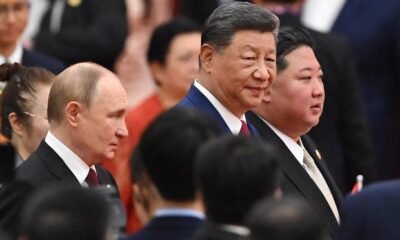Travel Guides & Articles
Now, India Resumes Issuing Tourist Visas to Chinese Citizens, Offering New Opportunities for Travel and Cultural Exchange Starting July 24, 2025

Wednesday, July 23, 2025
In a major step to mend ties and recover tourism, India has formally declared that it will start issuing tourist visas to its Chinese citizens from July 24, 2025 when India revoked the tourist visa suspension on Chinese tourists. The development comes after a gap of five years amid the stressed relationship following the Galwan Valley clash in June, 2020 and the COVID-19 pandemic. Reopening the visa channel is considered a sign of the two nations’ desire to mend fences and improve bilateral cooperation. Under the package, China will be permitted once again to send tourists to India, which will help bring economic dividends and cultural exchanges.
Both India and China have faced much tribulation over the years, especially between the two countries at their disputed border. Beyond the border tensions that were at their worst during the Galwan Valley clash, there was the global pandemic, which led to visa restrictions and a dearth of travel options. But the Indian government has made a move to ease the travel restrictions by resuming tourist visas for Chinese nationals.
Historical Context: A Five-Year Gap and Its Aftermath
The Galwan Valley clash in June 2020 was a key moment in the deterioration of relations between India and China. The violent border confrontation, which resulted in casualties on both sides, escalated tensions, prompting India to impose a series of measures in response. These included halting the issuance of tourist visas for Chinese nationals, imposing restrictions on Chinese investments, and banning popular Chinese mobile applications.
In parallel, the COVID-19 pandemic exacerbated the situation. China suspended visas for Indian nationals, and the pandemic-induced lockdowns and travel restrictions affected both countries’ ability to engage with each other on multiple fronts. The tourist visa suspension continued long after the worst of the pandemic had passed, further isolating the two countries.
The resumption of tourist visa services represents a diplomatic thaw after five years of strained relations. As both nations work to mend their ties, tourism serves as an important avenue for rebuilding trust, fostering cooperation, and boosting mutual understanding. The Indian government’s decision to ease travel restrictions for Chinese tourists is part of a broader effort to rejuvenate bilateral relations across multiple sectors.
Timeline of Key Developments Leading to Visa Resumption
2020-2022: Diplomatic Tensions and Pandemic Disruptions
The border conflict in Galwan Valley marked the beginning of a series of diplomatic challenges between India and China. In response to the clash, India imposed travel restrictions, including suspending tourist visas for Chinese nationals. These measures were compounded by the global COVID-19 pandemic, which severely disrupted international travel. While China began easing restrictions on business and student visas in 2022, the suspension of tourist visas for Indian and Chinese citizens remained in place until 2025.
2023-2024: Signs of Diplomatic De-escalation
Over the course of 2023 and 2024, diplomatic exchanges began to show signs of improvement. In October 2024, during the BRICS Summit in Russia, Indian Prime Minister Narendra Modi and Chinese President Xi Jinping engaged in discussions aimed at resolving key disputes and strengthening bilateral relations. Both leaders expressed a commitment to de-escalating tensions and improving cooperation in areas such as trade, border security, and cultural exchanges.
By January 2025, India and China had resumed direct flights, marking a significant step forward in their diplomatic engagements. This move laid the groundwork for further exchanges, with the resumption of tourism being the next logical step.
July 2025: Official Announcement of Visa Resumption
On July 23, 2025, the Indian Embassy in Beijing officially confirmed that tourist visas for Chinese nationals would resume starting July 24, 2025. This marked the end of a five-year break in tourist exchanges between the two countries. The announcement was widely welcomed by both governments, signaling that tourism, as a form of people-to-people diplomacy, could play a key role in rebuilding the relationship.
Economic Implications: Tourism’s Role in Revitalizing the Indian Economy
The resumption of tourist visas is expected to provide a much-needed boost to India’s tourism industry, which has been significantly impacted by the suspension. Prior to the suspension, Chinese tourists were a major source of international visitors to India. In 2019, approximately 1.4 million Chinese nationals visited India, contributing significantly to the tourism revenue.
Key Economic Benefits:
- Revival of Inbound Tourism: Chinese nationals are expected to return to India, visiting iconic destinations such as the Taj Mahal, Qutub Minar, Red Fort, and the palaces of Jaipur. These tourist hotspots, which depend on international visitors, will benefit from the reopening of the visa channel.
- Growth for the Hospitality Industry: India’s hospitality sector, including hotels, resorts, and transportation services, will see a surge in demand, benefiting from the increase in Chinese tourists. In particular, hotels that cater to international travelers in cities like New Delhi and Agra are poised to see a significant uptick in bookings.
- Job Creation and Economic Growth: The return of Chinese tourists will also create new jobs in the tourism sector, from tour guides and hotel staff to transportation providers and local craftspeople. With Chinese tourists known for their spending power, their return is expected to drive substantial economic growth in tourism-dependent regions.
- Strengthening Cultural Diplomacy: Tourism provides a platform for cultural diplomacy, fostering greater mutual understanding between India and China. As Chinese nationals visit India to explore its rich heritage and cultural landmarks, they are also exposed to India’s values, customs, and traditions.
Diplomatic Implications: Rebuilding Ties Through Tourism
The resumption of tourist visas between India and China is not just about boosting the tourism sector; it is also a vital element of broader diplomatic relations. Tourism has long been recognized as a powerful tool in fostering people-to-people exchanges, promoting understanding, and reducing tensions.
Key Diplomatic Benefits:
- Building Trust and Cooperation: Tourism allows for people-to-people interactions, which help build trust and cooperation between nations. By resuming visa issuance, both India and China are demonstrating their commitment to restoring positive relations.
- Economic Collaboration: Tourism fosters stronger economic collaboration, as both countries are likely to explore new opportunities for trade, investment, and infrastructure development. China has also shown interest in contributing to India’s tourism infrastructure development, which could further enhance bilateral ties.
- Soft Power Influence: Tourism serves as a vehicle for soft power. As China sends tourists to India, it strengthens its cultural and diplomatic influence in the region, while India also enhances its global stature by engaging tourists from one of the world’s largest and fastest-growing economies.
Challenges and Future Prospects for India-China Tourism
While the reopening of tourist visa channels is a positive step, several challenges remain, which could affect the flow of tourism between the two countries:
- Border Tensions: The India-China border dispute remains unresolved, and tensions could flare up again. Any future border skirmishes could lead to a suspension of visa services or the re-imposition of travel restrictions.
- Domestic Sentiment: Domestic public opinion in both countries could influence the future of tourism policies. Nationalist sentiments and political pressure could undermine efforts to foster diplomatic ties through tourism.
- Diplomatic Friction: Despite efforts to improve relations, India and China are still divided on key issues, such as trade imbalances and territorial claims. These differences could spill over into tourism policy if diplomatic relations take a downturn.
Conclusion: A New Beginning for India-China Relations
The resumption of tourist visas for Chinese nationals is a hopeful sign that India-China relations are entering a new chapter. While challenges remain, the move demonstrates both countries’ willingness to rebuild their relationship through diplomatic engagement and economic collaboration. The reopening of tourism channels provides a vital platform for cultural exchange, economic growth, and mutual understanding.
As both nations look to the future, tourism will continue to serve as a bridge between their peoples, helping to strengthen diplomatic ties and foster cooperation in various sectors. The Indian tourism industry stands poised for a revival, benefiting from the return of Chinese tourists, and providing a key avenue for positive India-China relations in the coming years.
Travel Guides & Articles
SpiceJet, IndiGo, Air India Issue Travel Advisories As IMD Predicts More Showers

Heavy rains across the national capital in the last two days disrupted flight operations, prompting airlines and the Delhi airport to issue travel advisories for passengers. Multiple airlines cautioned that adverse weather could cause delays and cancellations, while urging travellers to plan in advance and monitor their flight status.
Airlines issued advisories after intense rainfall in parts of Delhi-NCR on Sept. 3, which led to waterlogging, traffic congestion and slower movement to and from the Indira Gandhi International Airport.
The India Meteorological Department (IMD) has predicted further spells of rain for the next two days in Delhi and the National Capital Region (NCR), keeping fliers on alert.
Travel Guides & Articles
TBO acquires Classic Vacations to expand global reach

TBO has officially announced its agreement to acquire Classic Vacations, a U.S.-based luxury travel wholesaler, from Phoenix-headquartered Najafi Companies. The deal is valued at up to USD 125 million (INR 1,100 crore) and marks a major milestone in TBO’s expansion strategy. This acquisition combines TBO’s advanced technology-driven platform with Classic Vacations’ robust network of luxury travel advisors and suppliers.
Classic Vacations generated USD 111 million in revenue and an operating EBITDA of USD 11.2 million for the fiscal year ending December 31, 2024. With nearly five decades of brand recognition, Classic Vacations has built strong relationships in the premium travel sector, making it an ideal fit for TBO’s vision of scaling its global footprint.
According to Gaurav Bhatnagar, co-founder and joint managing director of TBO, “Classic Vacations has consistently delivered outstanding service, earning the trust of over 10,000 travel advisors across the U.S. Their expertise aligns perfectly with our mission of redefining global travel through innovation and scale.” Bhatnagar emphasised that the Classic Vacations brand will continue independently while leveraging TBO’s extensive technological and distribution strengths.
Ankush Nijhawan, co-founder and joint managing director of TBO, added that the acquisition underlines the company’s broader strategy of pursuing both organic and inorganic growth. He highlighted that TBO is actively open to future strategic partnerships that strengthen its portfolio and further position it as a global leader in premium and luxury travel solutions.
Melissa Krueger, CEO of Classic Vacations, expressed enthusiasm for the partnership, stating, “TBO’s technology-first solutions are designed to empower travel advisors with unparalleled tools, resources, and insider access. This integration ensures we bring even more value to our advisors and clients.” Krueger stressed that the collaboration enhances Classic Vacations’ role as the premier luxury travel partner while expanding its global reach.
This acquisition signals a new phase for both companies, bringing together complementary strengths to serve an evolving luxury travel market. With demand for high-end travel projected to surge worldwide, the partnership positions TBO and Classic Vacations to accelerate growth, maintain brand trust, and deliver seamless experiences to customers, suppliers, and employees across the globe.
Travel Guides & Articles
Centrum Air to launch Delhi–Tashkent direct flights

Centrum Air, Uzbekistan’s largest private airline, has announced the launch of direct scheduled flights between Delhi and Tashkent, starting from October 3, 2025. The new service aims to strengthen air connectivity between India and Uzbekistan, offering travellers an affordable, comfortable, and time-efficient travel option.
The flights will operate twice weekly, every Tuesday and Friday, providing flexibility and convenience for both business and leisure travellers. Centrum Air’s modern fleet, including Airbus A320neo, A321neo, and the wide-body A330-300, will be deployed on this route to ensure a safe and comfortable journey.
According to the announced schedule (local time), flights from Delhi will depart at 12:10 and arrive in Tashkent at 14:50. From Tashkent, flights will leave at 06:55 and land in Delhi at 10:55. These timings are designed to offer smooth connections and ease of travel for passengers.
Abdulaziz Abdurakhmanov, Founder and CEO of Centrum Air, expressed pride in opening the direct Delhi–Tashkent route. He emphasized that the service would not only improve travel convenience but also enhance Uzbekistan’s role as a regional hub, linking India to Central Asia, Europe, and the Middle East.
Abhishek Goyal, Executive Director & CEO of Aeroprime Group, highlighted the significance of being Centrum Air’s exclusive GSA in India. He stated that the partnership would bring immense opportunities for tourism, business, and trade, while ensuring competitive fares and strong support for passengers and cargo operations.
With Aeroprime Group managing sales, marketing, and customer services in India, travellers can expect seamless experiences. Additionally, the new service offers convenient onward connections from Tashkent to destinations such as Almaty, Istanbul, Dubai, Tel Aviv, and Copenhagen, making it a valuable option for both direct and transit passengers.
-

 Business6 days ago
Business6 days agoThe Guardian view on Trump and the Fed: independence is no substitute for accountability | Editorial
-
Tools & Platforms3 weeks ago
Building Trust in Military AI Starts with Opening the Black Box – War on the Rocks
-

 Ethics & Policy1 month ago
Ethics & Policy1 month agoSDAIA Supports Saudi Arabia’s Leadership in Shaping Global AI Ethics, Policy, and Research – وكالة الأنباء السعودية
-

 Events & Conferences4 months ago
Events & Conferences4 months agoJourney to 1000 models: Scaling Instagram’s recommendation system
-

 Jobs & Careers2 months ago
Jobs & Careers2 months agoMumbai-based Perplexity Alternative Has 60k+ Users Without Funding
-

 Education2 months ago
Education2 months agoVEX Robotics launches AI-powered classroom robotics system
-

 Funding & Business2 months ago
Funding & Business2 months agoKayak and Expedia race to build AI travel agents that turn social posts into itineraries
-

 Podcasts & Talks2 months ago
Podcasts & Talks2 months agoHappy 4th of July! 🎆 Made with Veo 3 in Gemini
-

 Podcasts & Talks2 months ago
Podcasts & Talks2 months agoOpenAI 🤝 @teamganassi
-

 Education2 months ago
Education2 months agoAERDF highlights the latest PreK-12 discoveries and inventions





















